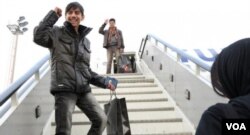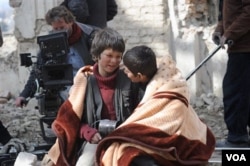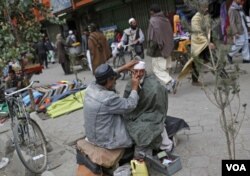Student Union
Fawad and Buzkashi Boys: Does Hard Work, or Fate and Coincidence, Create Success?
As I surf my Facebook newsfeed, a photo catches my attention. Two Afghan boys smile broadly as they board a Turkish airplane. The boys are Fawad Mohammadi and Jawanmard Paiz, the lead actors in "Buzkashi Boys," an Oscar-nominated short film about friends who dream of becoming horseback riders in Afghanistan’s fierce version of polo. These two young actors are traveling from the dusty streets of Kabul to the red carpet at the 2013 Academy Awards in Hollywood.
This journey is especially auspicious for Fawad, a 14-year-old who sells maps to foreigners on the streets of Kabul, and was chosen for the role because director Sam French, who lived in Afghanistan, would bump into him on the street (French described him as “the kindest and most warm-hearted street-kid”). The youngest of seven siblings, but also a breadwinner for the family, Fawad is about to make his Oscar debut beside prominent movie stars such as Daniel Day-Lewis, Bradley Cooper, and Jennifer Lawrence.
However, this picture soon kindles other thoughts in my mind. I ponder over the matters of destiny and coincidences; what would have happened if director Sam French had not met Fawad on the streets of Kabul? Was it fate or mere coincidence that took Fawad to the red carpet?
The questions evoke in me a nostalgic memory, a memory as vivid as my accounts of yesterday.
***
I have just confirmed my spot at a university after a protracted period of anxiety and uncertainty. I now have to go through the ordeal of receiving my I-20 form, getting my visa and tickets, and bidding farewell to all I was leaving behind. I know that soon I will be leaving this place and will call another country home for the next four years of my life.An urge to record memories of the city I live in propels me outside. I set foot on the narrow street that connects my house to the main road. It is near dusk and the beams of the fading sun permeate the thick smoggy air and shine on the façades of the muddy and marble-clad houses that sit next to each other as uncomfortable neighbors. As usual the dust penetrates my skin and my lungs. It tightens my chest and burns my eyes. The atmosphere is further polluted with the honking of cars and buses, the sound of cart wheels on the paved road, and the cacophony of shopkeepers advertising their products.
Soon I will leave behind these realities and start on my path towards a successful future. I feel elated that my hard work has finally paid off. I think about all the time I spent sharpening my English skills, writing numerous essays, cramming for the SATs, and filling out applications.
I start to peruse the expressions of the people in front of me – those I will be leaving behind: the youth in their tight jeans and colorful t-shirts, the old men with their turbans and wrinkled faces, and women of all ages, some draped with burqas and some with scarves.
These youth grew up fancying a world, on the other side of the oceans, where people lead comfortable lives, where violence is not a ubiquitous reality, and where freedom is an inseparable human right. So many would, and some will, risk their lives to travel across those oceans, legally or illegally, in search of better futures, and yet in the older generation I see the harsh truth – most will have to sacrifice their dreams of success for mere survival.
***
That day, despite my heartfelt sadness for all the challenges they faced, I merely wished them good luck as they passed by. I had hoped that life would start to treat them better.But as I reminisce now about that day, I realize that mingled in the crowd I saw that day could be so many people much smarter than I am, but who did not have access to the opportunities that I have had. Kids who had to give up school in order to work and support their families, or kids whose dreams did not extend beyond being allowed to attend a school.
I know that I worked hard to achieve what I have, but I also know that I am lucky to have the opportunity to travel halfway across the world and pursue the highest quality education. I catch myself wondering: was it just my hard work, or is it an invisible hand of fate that earned me my modest successes? Am I the beneficiary of sheer coincidences and luck?
And this raises even more questions in my mind. How many of these kids who wander on the streets have the possibility of receiving a decent education, if any? How many of them will have the luxury of learning English and applying to American universities like I did? Wouldn’t I be one of these street children, had it not been for a fluke of chance?
Perhaps under the desolate figures of each of these children who labor on the streets lurks a talent that has not been given a chance to flourish. Perhaps each of these kids could have enjoyed the opportunities I did and could have ended up at a decent American university instead of me.
Each of these kids who walked around me could be a Fawad, if only Sam French had bumped into them on the streets instead. How many talents worldwide perish undiscovered just because they are not recognized?
I have begun to question the role fate and chance play in our lives. I remember that the settings in which we are born and the coincidences that happen to us significantly shape our futures. After all, we could as easily have been born a peasant in China or a beggar in an Indian slum.
And I am left wondering how much of our successes can be attributed to hard work, and how much to destiny and coincidences.
See all News Updates of the Day
- By VOA News
Competition grows for international students eyeing Yale

It’s tough to gain admission to Yale University, and it’s getting even tougher for international students as standout students from around the world set their sights on Yale.
The Yale Dale News, the campus newspaper, takes a look at the situation here.
- By VOA News
Student from Ethiopia says Whitman College culture made it easy to settle in

Ruth Chane, a computer science major from Ethiopia, writes about her experiences settling into student life at Whitman College in the U.S. state of Washington.
"The community at Whitman College made sure I felt welcomed even before I stepped foot on campus," she says.
- By VOA News
Claremont Colleges student gets a shock when she heads home to Shanghai

In The Student Life, the student newspaper for the Claremont Colleges, a consortium of five liberal art colleges and two graduate schools in Claremont, California, student Rochelle Lu writes about readjusting to her Shanghai home after spending a semester in the United States.
- By VOA News
Cedarville University aims to ease transition for international students

Cedarville University in the U.S. state of Ohio says it’s got more than 140 international students representing 44 countries.
Here, the school interviews Jonathan Sutton, director of international student services. He talks about his job and the opportunities for international students on campus.
- By VOA News
Morehouse College offers prospective students tips on applying and thriving

Morehouse College, a private, historically Black liberal arts college in the U.S. state of Georgia, offers a guide for international students interested in attending the school.
Among the tips to apply and thrive at Morehouse:
- Take advantage of the school’s orientation program
- Turn to the school’s Center for Academic Success for tutoring, support and more
- Immerse yourself in campus life via clubs and societies
- By Reuters
US reviews Columbia University contracts, grants over antisemitism allegations

The administration of President Donald Trump said on Monday it will review Columbia University's federal contracts and grants over allegations of antisemitism, which it says the educational institution has shown inaction in tackling.
Rights advocates note rising antisemitism, Islamophobia and anti-Arab bias since U.S. ally Israel's devastating military assault on Gaza began after Palestinian Hamas militants' deadly October 2023 attack.
The Justice Department said a month ago it formed a task force to fight antisemitism. The U.S. Departments of Health and Education and the General Services Administration jointly made the review announcement on Monday.
"The Federal Government's Task Force to Combat Anti-Semitism is considering Stop Work Orders for $51.4 million in contracts between Columbia University and the Federal Government," the joint statement said.
The agencies said no contracting actions had been taken yet.
"The task force will also conduct a comprehensive review of the more than $5 billion in federal grant commitments to Columbia University."
The agencies did not respond to requests for comment on whether there were similar reviews over allegations of Islamophobia and anti-Arab bias.
Columbia had no immediate comment. It previously said it made efforts to tackle antisemitism.
College protests
Trump has signed an executive order to combat antisemitism and pledged to deport non-citizen college students and others who took part in pro-Palestinian protests.
Columbia was at the center of college protests in which demonstrators demanded an end to U.S. support for Israel due to the humanitarian crisis caused by Israel's assault on Gaza. There were allegations of antisemitism and Islamophobia in protests and counter-protests.
During last summer's demonstrations around the country, classes were canceled, some university administrators resigned and student protesters were suspended and arrested.
While the intensity of protests has decreased in recent months, there were some demonstrations last week in New York after the expulsion of two students at Columbia University-affiliated Barnard College and after New York Governor Kathy Hochul ordered the removal of a Palestinian studies job listing at Hunter College.
A third student at Barnard College has since been expelled, this one related to the occupation of the Hamilton Hall building at Columbia last year.
Canada’s immigration overhaul signals global shift in student migration
From Europe to North America, nations are tightening their immigration policies. Now Canada, long seen as one of the world's most welcoming nations, has introduced sweeping changes affecting international students. The reforms highlight a growing global trend toward more restrictive immigration policies. Arzouma Kompaore reports from Calgary.
Trump administration opens antisemitism inquiries at 5 colleges, including Columbia and Berkeley

The Trump administration is opening new investigations into allegations of antisemitism at five U.S. universities including Columbia and the University of California, Berkeley, the Education Department announced Monday.
It's part of President Donald Trump's promise to take a tougher stance against campus antisemitism and deal out harsher penalties than the Biden administration, which settled a flurry of cases with universities in its final weeks. It comes the same day the Justice Department announced a new task force to root out antisemitism on college campuses.
In an order signed last week, Trump called for aggressive action to fight anti-Jewish bias on campuses, including the deportation of foreign students who have participated in pro-Palestinian protests.
Along with Columbia and Berkeley, the department is now investigating the University of Minnesota, Northwestern University and Portland State University. The cases were opened using the department's power to launch its own civil rights reviews, unlike the majority of investigations, which stem from complaints.
Messages seeking comment were left with all five universities.
A statement from the Education Department criticized colleges for tolerating antisemitism after Hamas' Oct. 7, 2023, attack on Israel and a wave of pro-Palestinian protests that followed. It also criticized the Biden administration for negotiating "toothless" resolutions that failed to hold schools accountable.
"Today, the Department is putting universities, colleges, and K-12 schools on notice: this administration will not tolerate continued institutional indifference to the wellbeing of Jewish students on American campuses," said Craig Trainor, the agency's acting assistant secretary for civil rights.
The department didn't provide details about the inquiries or how it decided which schools are being targeted. Presidents of Columbia and Northwestern were among those called to testify on Capitol Hill last year as Republicans sought accountability for allegations of antisemitism. The hearings contributed to the resignation of multiple university presidents, including Columbia's Minouche Shafik.
An October report from House Republicans accused Columbia of failing to punish pro-Palestinian students who took over a campus building, and it called Northwestern's negotiations with student protesters a "stunning capitulation."
House Republicans applauded the new investigations. Representative Tim Walberg, chair of the Education and Workforce Committee, said he was "glad that we finally have an administration who is taking action to protect Jewish students."
Trump's order also calls for a full review of antisemitism complaints filed with the Education Department since Oct. 7, 2023, including pending and resolved cases from the Biden administration. It encourages the Justice Department to take action to enforce civil rights laws.
Last week's order drew backlash from civil rights groups who said it violated First Amendment rights that protect political speech.
The new task force announced Monday includes the Justice and Education departments along with Health and Human Services.
"The Department takes seriously our responsibility to eradicate this hatred wherever it is found," said Leo Terrell, assistant attorney general for civil rights. "The Task Force to Combat Anti-Semitism is the first step in giving life to President Trump's renewed commitment to ending anti-Semitism in our schools."
- By VOA News
STEM, business top subjects for international students

The Times of India breaks down the most popular subjects for international students to study in the U.S.
STEM and business lead the pack. Read the full story here. (January 2025)
- By VOA News
Safety and visa difficulties among misconceptions about US colleges

U.S. News & World report addresses some of the misconceptions about U.S. colleges and universities, including the difficulty of getting a visa.
Read the full story here. (January 2025)
- By VOA News
Work opportunities help draw international students to US schools

US News & World Report details the three top factors in foreign students' decision to study in the U.S. They include research opportunities and the reputation of U.S. degrees. Read the full story here. (December 2024)
- By VOA News
British student talks about her culture shock in Ohio

A British student who did a year abroad at Bowling Green State University in Ohio talks about adjusting to life in America in a TikTok video, Newsweek magazine reports.
Among the biggest surprises? Portion sizes, jaywalking laws and dorm room beds.
Read the full story here. (December 2024)
- By VOA News
Harvard's Chan School tells international students what to expect

Harvard's T.H. Chan School of Public Health reaches out to international students by detailing the international student experience at the school.
Learn more about housing, life in Boston and more here.
- By Reuters
China unveils plan to build 'strong education nation' by 2035

China issued its first national action plan to build a "strong education nation" by 2035, which it said would help coordinate its education development, improve efficiencies in innovation and build a "strong country."
The plan, issued Sunday by the Communist Party's central committee and the State Council, aims to establish a "high quality education system" with accessibility and quality "among the best in the world."
The announcement was made after data on Friday showed China's population fell for a third consecutive year in 2024, with the number of deaths outpacing a slight increase in births, and experts cautioning that the downturn will worsen in the coming years.
High childcare and education costs have been a key factor for many young Chinese opting out of having children, at a time when many face uncertainty over their job prospects amid sluggish economic growth.
"By 2035, an education power will be built," the official Xinhua news agency said, adding that China would explore gradually expanding the scope of free education, increase "high-quality" undergraduate enrolment, expand postgraduate education, and raise the proportion of doctoral students.
The plan aims to promote "healthy growth and all-round development of students," making sure primary and secondary school students have at least two hours of physical activity daily, to effectively control the myopia, or nearsightedness, and obesity rates.
"Popularizing" mental health education and establishing a national student mental health monitoring and early warning system would also be implemented, it said.
It also aims to narrow the gap between urban and rural areas to improve the operating conditions of small-scale rural schools and improve the care system for children with disabilities and those belonging to agricultural migrant populations.
The plan also aims to steadily increase the supply of kindergarten places and the accessibility of preschool education.
- By VOA News
A look at financial aid options for international graduate students in US

The Open Notebook, a site focusing on educating journalists who cover science, has complied a list of U.S. graduate program financial aid information for international students.









